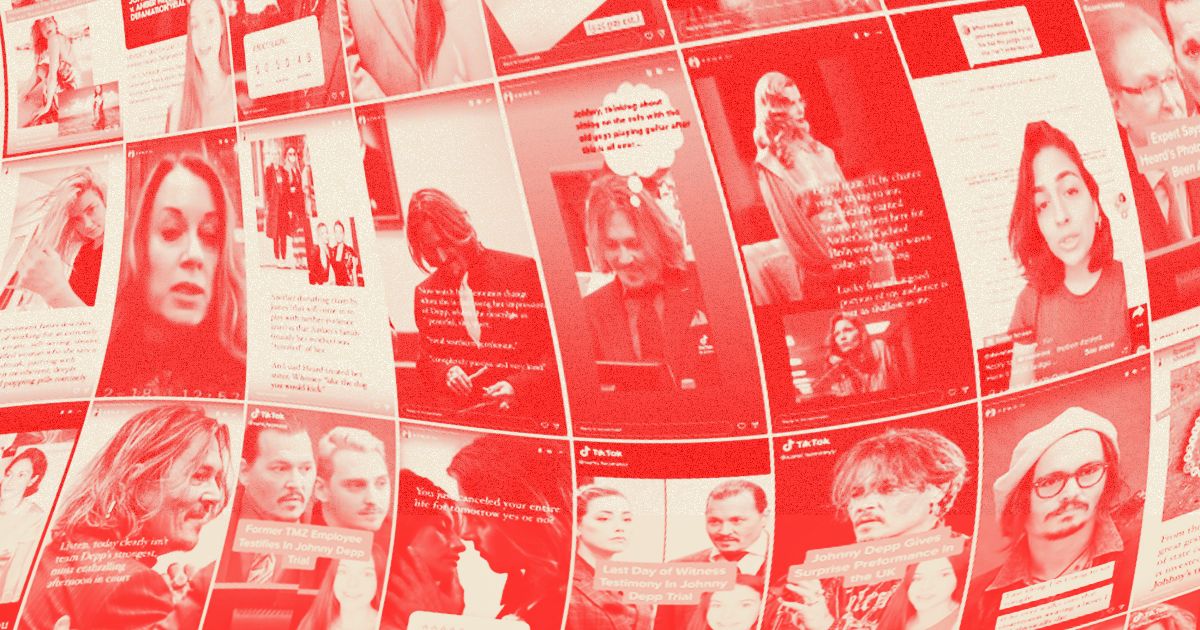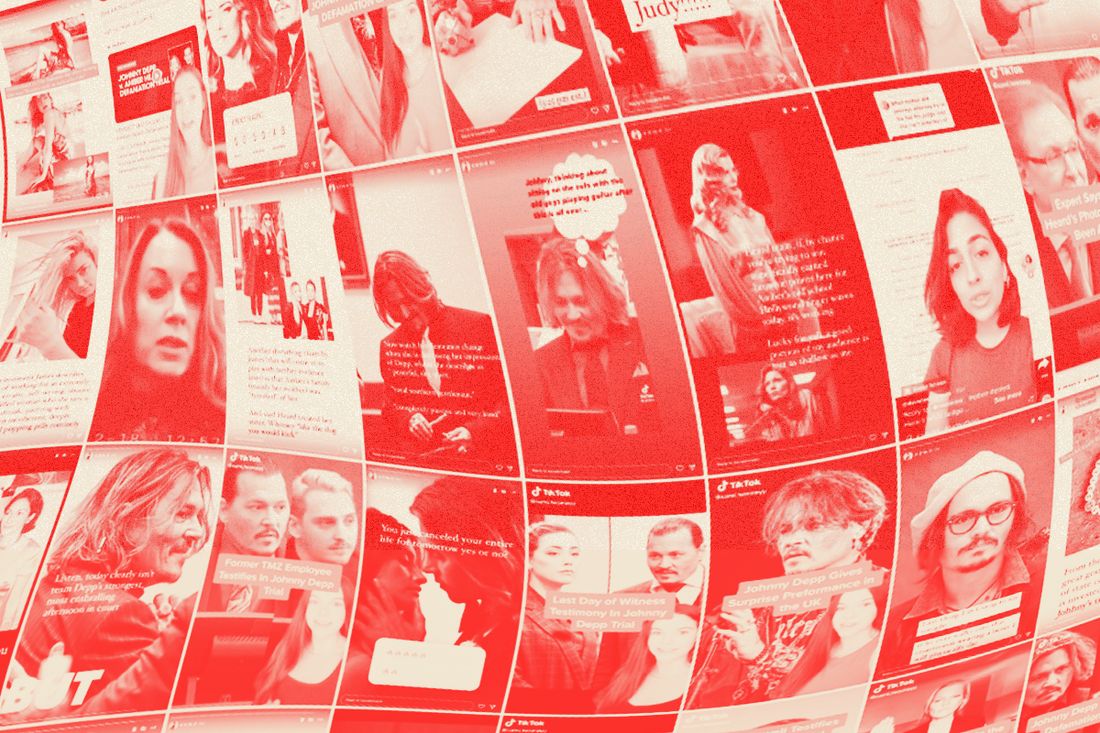
The TikTok Accounts That Influenced the Depp-Heard Trial

Photo-Illustration: Susanna Hayward
The latest era for the elite mainstream media — that is the heavily paywalled, rule-bound, college-educated-reader-focused American news media — has been marked by a rolling journalistic reassessment of how women are covered. This began with the investigations into Harvey Weinstein five years ago. More recently, readers have followed along as writers (and their editors) explore how journalism has historically treated women as sex objects and punch lines. Most notably: the appropriate obsession with freeing Britney Spears, who became the subject of esteemed investigative projects and mournful personal essays; Justin Timberlake was finally shamed into apologizing to Spears and Janet Jackson; Paris Hilton took to the Washington Post and Congress to crusade against the cruel “troubled teen” industry and was treated with respect for the first time; writers explained to readers that Kim Kardashian, future Esq., was no longer to be blamed for the horrible things her ex-husband might say. And as the mainstream media has begun to reckon with its misogynist recent history, its business model has already changed in ways that reward this kind of interrogation. Publications from the New York Times to the Atlantic to this magazine have doubled down on serving paying subscribers. Our paywalls have become tighter; our quest for elite readers more thirsty.
At the same time, a new media class has exploded: creators and influencers working all the lanes, from lifestyle fluff to political opinion to citizen court reporters. Critical and suspicious of the stuffy traditional media, these social-media accounts comment on and sometimes even start the biggest conversations of the moment. They post fast and often — sometimes hundreds of times a day — and don’t have to pretend they’re objective. In fact, they’ve shown that news consumers are delighted when they pick sides. The most successful of them are sophisticated visual storytellers who know how to captivate an audience — and, as we’ve seen this spring, they have no qualms about flogging a famous woman.
If you’ve been too busy at the opera this spring, you might have missed that the actor Johnny Depp sued his ex-wife for defamation for simply saying she was known as a face of abuse; she countersued because one of his lawyers called her abuse claims a hoax. After weeks of wild testimony, a jury said they both won, quite impossibly, though his award was $10 million and hers was just $2 million.
Despite Depp basically being declared a court-vetted wife-beater in another trial in England, this trial triggered a public celebration of Johnny Depp enthusiasm rivaling the goodwill received by the non-problematic pantheon of Tom Hanks, the Rock, Chris Evans, and Keanu Reeves. Heard became a singular object of scorn, as an audience of Gen-Z celebrity-gossip enthusiasts and Gen-X Instagrammers — convinced mostly as a consequence of their youthful imprinting by What’s Eating Gilbert Grape that Depp would win his case — united to decide she was the devil.
The mainstream media noticed the frenzy only once it was in full swing. In essays and op-eds, we chastised these influencer detectives (Click Tracys?), who were seemingly hearing different testimony than we were. Their reach and vitriol was, for many of us, shocking. Any given Depp-stanning TikToker camped outside the courthouse may reach many times more readers than the newspaper staffer dutifully covering the trial. We were busy believing women, while women online were calling for Heard’s head — and they, more than us, were shaping the general public’s understanding of the trial.
There is, so far, only one proven fact in digital publishing: The more you publish the more successful you are. Nearly every influential success, from Trump to the New York Times to DeuxMoi, is based on frequency and constancy. The most effective of the influencers turned commentators, like @houseinhabit’s Jessica Reed Kraus, know this. Kraus is a San Clemente, California, mother who got her start in the content mines as a lifestyle blogger (picture lots of wavy-haired sons, surfboards, pools, and exposed ceiling beams). Over the past year or so, she morphed into a trial-obsessed Instagrammer. Her gossipy roller-coaster ride through evidence and pop culture has earned her almost 1 million Instagram followers and apparently thousands of paid Substack subscribers. “In an era of growing censorship and distrust in paid media designed to divide and distract us, I hoped this space offers anyone looking for anything else, refreshing respite,” she told her audience. “Expect the return of unhinged humor, biting sarcasm, and people talking like real people again. Unguarded and uncut.”
Kraus folds together her own commentary, court evidence, trial video, and professional photos to which she surely cannot claim copyright. (“Photoshoot in The Bahamas day after claiming she was ‘beaten within an inch of her life,’” Kraus posted over a skin-baring image of Heard.) She also has a clever natural sense for cheering on a surprising side: Just as she was strongly, disturbingly sympathetic to Ghislaine Maxwell, she was a chief instigator of the anti-Heard story line.
Her posture is part truth-telling reporter, part YouTube-drama blogger. In either case, being an underdog with powerful enemies is good for the brand. So it was a bit of good fortune when her main account on Instagram was, she claimed, suspended. “Thrashing around the trenches of a ramped up online war I was warned about in the very beginning. All coming to a head with the end of the trial closing in, my account (before suspension) hanging on the edge of the 1M mark, and my viewing numbers sky rocketing in anticipation of a verdict expected to arrive Thursday or Friday,” she wrote on May 20. “The whole thing feels very calculated. I feel like I’m siting here with my hands tied, paying a hefty price for seeking truth.”
She alluded to a smear campaign, a hit job that was supposed to appear in the New York Post, and more: “I’ve become rooted at the center of this whole sensational circus.” Was she though? Her account was apparently restored — and then, as the verdict came, she delivered a stroke of narrative genius. She said she was in London and posted video of Depp singing at Royal Albert Hall (from good seats, no less). This aura of exclusivity and proximity blew her fans away.
Kraus is just one of hundreds who racked up huge numbers and built followers during the trial. Devotedly.yours has posted hundreds of times, attracting millions of views. A self-described Egyptian American single mom of two in Virginia, “forever a Swiftie & Potterhead,” she has spoken out about domestic violence in the past. But don’t assume that means she would side with Heard. On June 1, she joined the other Depp supporters outside the Fairfax courthouse for the verdict. “Johnny, Johnny!” everyone chanted.
“I’ve been following this from day one, and I believe him and the media has been so against him,” she said, in a fascinating expression, since as far as I can see, she is the media.
Cami Twomey, 19, has made a name for herself as a Gen-Z Peter Jennings. She pivoted from Met Gala looks and an item titled “Megan Fox and MGK Drink Eachothers Blood” into 118 nearly consecutive videos about Depp. Her news-anchor-style updates on the case — in which she speaks directly to the camera over still photos of Depp and Heard — have attracted 47 million likes on TikTok. She, too, cheered on the verdict as #justiceforjohnnydepp.
All their personalities and backstories add value to their coverage. Twomey, if you dig back a few hundred videos, reveals how she was permanently and invisibly disabled by COVID. It puts her constant posting into a new context. “People have no idea what’s going on behind the scenes,” she reminds us. “Every day is a fight.”
Now that the trial is over, these creators and many more are left with huge audiences. What will they do with this enormous market share of Americans — who would probably enjoy the cruel original coverage of Britney Spears over enlightened self-flogging any day? Some of them will find another trial to cover; will musician FKA twigs’s domestic-violence suit against actor Shia LaBeouf attract as much attention? There will be growing pains. Most of these influencers, who speak confidently about defamation, likely have no idea just how often newspapers and magazines are sued. Copyright strikes, targeted mass-reporting campaigns, and defamation lawsuits will hinder the most successful; they’ll face friction not just from lawsuits but from their publishing platforms, from sponsors, and from their peers. Time will likely force this media, too, into building subscribers, if it can. If the innovators stay in the game, they’ll find out just how lousy the media business can be.
Want more stories like this one? Subscribe now to support our journalism and get unlimited access to our coverage. If you prefer to read in print, you can also find this article in the June 6, 2022, issue of New York Magazine.
